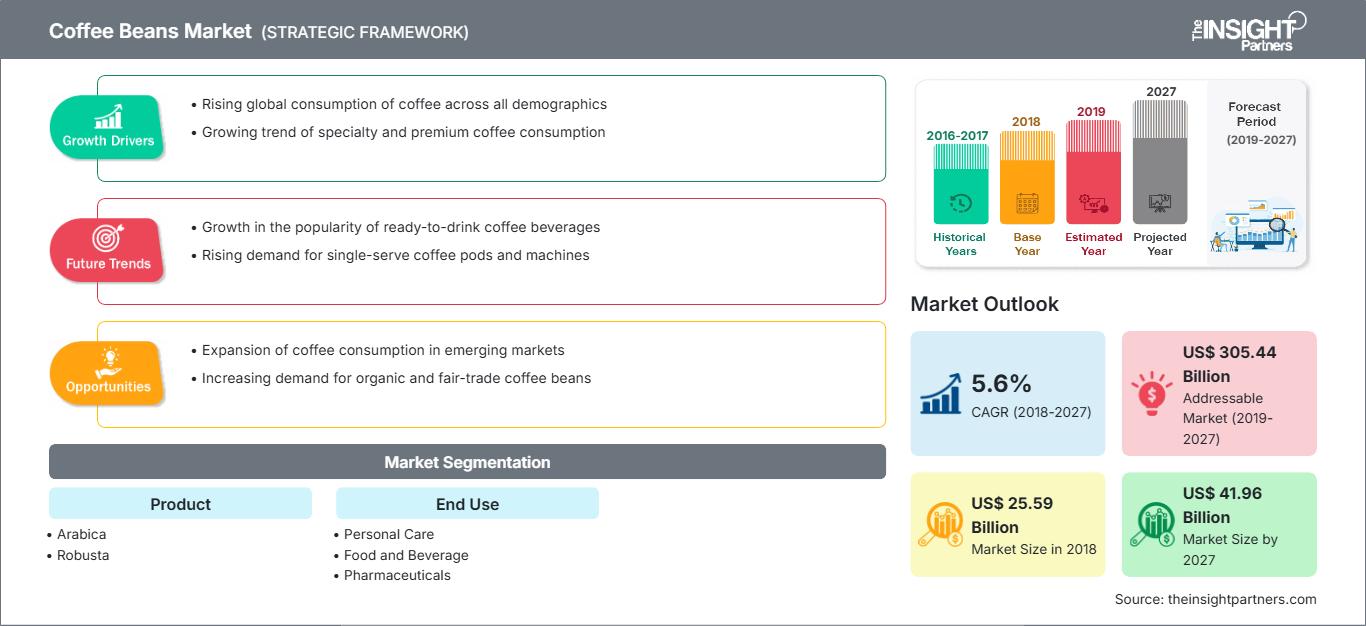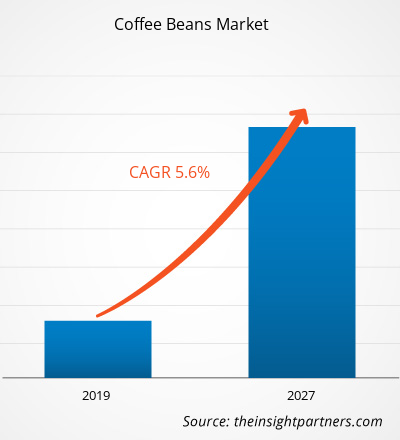[調査レポート]コーヒー豆市場は2018年に255億9,170万米ドルと評価され、2027年には419億6,240万米ドルに達すると予測されています。また、2019年から2027年にかけて5.6%のCAGRで成長すると見込まれています。
コーヒー豆は、コーヒーの豊富な供給源であるコーヒーノキが生産する種子です。コーヒー豆は正確には豆ではありませんが、見た目が豆に似ていることからコーヒー豆と呼ばれています。普通のチェリーと同様に、コーヒー豆もいわゆる核果です。コーヒーノキの2つの最も重要な品種は、アラビカ種とロブスタ種です。いくつかの研究によると、コーヒーノキはエチオピアでカルディというヤギ飼いによって初めて発見されました。コーヒー豆は主要な換金作物であり、輸出にとって重要な製品です。製品に基づいて、コーヒー豆市場はアラビカ種、ロブスタ種、その他に分類されます。 2018年には、アラビカ種が大きな市場シェアを占め、市場を席巻しました。アラビカの木は、上質で香り高いコーヒーを生産します。アラビカの豆はロブスタ種に比べて平らで細長く、カフェイン含有量が低いです。アラビカコーヒー豆はカロリーが低く、ナイアシン、カリウム、マンガンなどのミネラルを豊富に含んでいます。高品質のアラビカコーヒーは、ほんのり甘く、チョコレート、ナッツ、キャラメルの風味があります。苦味が少なく、わずかに酸味がある場合もあります。
アジア太平洋地域は、予測期間中に6.0%という最高のCAGRで成長すると予想されています。アジア太平洋地域は、同地域の消費者の間で様々なコーヒー製品の人気の高まりにより、世界のコーヒー豆市場で大きなシェアを獲得すると予想されています。インド、タイ、フィリピン、インドネシアなどの国では、コーヒーカフェやコーヒー店の数が増加しており、これもコーヒー豆市場の拡大に貢献しています。東南アジアの気候と地理的条件は、コーヒー栽培に非常に理想的です。さらに、この地域のコーヒー文化とコーヒー生産における専門知識は、この地域のコーヒー産業の繁栄に貢献しています。インドネシア、ベトナム、ラオスなど、東南アジア諸国はコーヒー輸出大国となっています。タイもコーヒー需要の増加により、ビジネスと投資を惹きつけています。さらに、フィリピンはニッチ市場と国内のスペシャルティコーヒー需要の増加をターゲットにするため、コーヒー産業の復興に尽力しています。現在、ベトナムはブラジルに次ぐ世界第2位のコーヒー輸出国です。 2017年のコーヒー生産量は60kg入りで、総生産量は29,500,000袋で、インドネシアがそれに続き、総生産量は10,902,000袋でした。
COVID-19のコーヒー豆市場への影響
COVID-19の発生は、2019年12月に武漢(中国)で始まり、それ以来世界中に急速に広がっています。2020年3月現在、中国、イタリア、イラン、インド、ロシア、スペイン、韓国、フランス、ドイツ、米国は、確認された症例数と報告された死亡者数で最も被害が大きい国の一部です。最新のWHOの統計によると、世界で約9,843,073人の確認症例と495,760人の死亡が報告されています。COVID-19の発生は、ロックダウン、渡航禁止、事業閉鎖により、さまざまな国の経済と産業に影響を及ぼしています。世界の食品加工業界は、今回の感染拡大により、工場の閉鎖、サプライチェーンの崩壊、技術イベントのキャンセル、オフィスの閉鎖など、深刻な混乱に直面している主要産業の 1 つです。
要件に合わせてレポートをカスタマイズ
レポートの一部、国レベルの分析、Excelデータパックなどを含め、スタートアップ&大学向けに特別オファーや割引もご利用いただけます(無償)
コーヒー豆市場: 戦略的洞察

-
このレポートの主要な市場動向を入手してください。この無料サンプルには、市場動向から見積もりや予測に至るまでのデータ分析が含まれます。
コーヒーは世界で最も消費されている飲料の一つです。特にインド、中国、フィリピンなどの国々では、若年層の間でコーヒー人気が急上昇しており、コーヒー豆の需要を牽引しています。コーヒー消費の主な動機は、機能性、味覚と嗜好、習慣、伝統、文化、社会化など、多岐にわたります。中流階級人口の増加と生活水準の全体的な向上が、コーヒーとコーヒー飲料の需要増加に貢献しています。オフィスワーカーの間でもコーヒーの消費量が大幅に増加しています。地元のコーヒーショップや新規開店店の開店・拡大もコーヒー需要を押し上げる要因の一つであり、コーヒー豆市場の成長にも貢献しています。さらに、消費者がコーヒーをミルクに混ぜて美味しく飲むため、ミルクの消費量の増加も市場の成長を後押ししています。コーヒーショップでゆっくりとくつろぎ、質の高い時間を過ごせる機会も消費者の注目を集め、コーヒーの需要増加につながっています。これに加えて、コーヒーショップは図書館の代わりとしての役割を果たしています。また、コーヒーを飲むことは若者にとって一種のファッションやリラックスしたライフスタイルと見なされており、それがコーヒーの需要の急増につながっています。コーヒー豆は、様々なタイプのコーヒーブレンドで販売する目的でさまざまな方法で処理され、小売店、食料品店、オンラインで販売されています。
製品インサイト
製品に基づいて、コーヒー豆市場はアラビカ、ロブスタ、その他に分類されています。アラビカセグメントは2018年に世界のコーヒー豆市場で最大のシェアを占め、ロブスタセグメントは予測期間中に高いCAGRで成長すると予想されています。アラビカコーヒーは、コーヒーの中で最も古く、最も優勢な種です。アラビカのコーヒーノキから得られ、マウンテンコーヒーまたはコーヒーアラビカとしても知られています。アラビカコーヒーは、世界のコーヒーの生産量と消費量のほぼ60%を占めています。アラビカ豆はエチオピア、南スーダン、イエメン原産で、12 世紀から栽培されてきました。現在では、アフリカからラテンアメリカ、アジアからカリブ海諸国まで、世界中で栽培されています。アラビカの植物は、白い花と鮮やかな赤い実をつける木または大きな低木です。これらの実にはそれぞれ 2 つの種子があり、最終的にコーヒー豆になります。アラビカの植物が完全に成熟して実を結ぶまでには約 7 年かかります。また、その 7 年間はコーヒーを収穫できません。アラビカはロブスタに比べて脂質が 60% 多く、糖の濃度が 2 倍です。アラビカの植物は低温に耐えることができ、平均気温が 15 度から 24 度のとき最もよく成長します。アラビカ種のコーヒーの 1 つの株には、少量のカフェインが含まれています。アラビカ コーヒーは抗酸化物質が豊富で、ナイアシン、マグネシウム、マンガン、カリウムなどのビタミンやミネラルも少量含まれています。良質のアラビカコーヒーは、ナッツ、キャラメル、チョコレートの風味がほんのりと香る、ほんのりとした甘い風味があります。Louis Dreyfus Company、Bharat Company Depot などは、アラビカコーヒー豆を提供している企業の一部です。
最終用途の洞察
最終用途に基づいて、コーヒー豆市場は、食品および飲料、パーソナルケア、医薬品に分類されています。食品および飲料セグメントは、2018 年に世界のコーヒー豆市場で最大のシェアを占め、予測期間中に最も高い成長率を記録すると予想されています。コーヒーは商品化された食品の 1 つであり、世界で最も広く消費されている飲料です。コーヒー消費量が増加している理由には、さまざまな品種の選択によるコーヒー品質の向上、農業慣行の改善、専門店の設立などが挙げられます。コーヒー豆は抗酸化物質が豊富で糖尿病のリスクを軽減し、炎症と戦うため、さまざまな食品に使用されています。カフェインなどの食品モカクッキー、コーヒーシュガークッキー、コーヒーラブステーキ、コーヒーチョコレートブラウニー、コーヒーラブクラストポークローストは、コーヒーまたはコーヒー豆を使用して作られています。カフェモカクッキーにコーヒー豆を使用すると、香ばしいコーヒーの風味だけでなく、豊かなチョコレートの風味も加わります。コーヒーシュガークッキーは、濃厚で力強いコーヒーの風味と甘い風味を提供します。ブラウニーの濃厚なデザートと滑らかなコーヒーの風味が相まって、コーヒーに食欲をそそる味わいを加えます。コーヒー飲料は、世界中でさまざまな流行やスタイルで用意され、提供されていますが、準備方法と使用される材料は異なります。エスプレッソ、エスプレッソマキアート、カプチーノは、大多数の人々が消費するコーヒー飲料の一部です。
企業は、世界中で事業を拡大するために、合併や買収、研究開発を一般的に採用しており、これが市場規模にさらに影響を与えています。 Illycafe SpAやPeets Coffeeといったコーヒー豆市場のプレーヤーは、顧客基盤の拡大と世界的な市場シェアの獲得を目指し、合併・買収(M&A)や研究開発戦略を展開しています。これにより、プレーヤーはグローバルなブランド名を維持することが可能となります。例えば、2019年8月、Illycafe SpAはEuro Food Brands(EFBグループ)から英国における流通事業を買収すると発表しました。Euro Food Brandsは、英国におけるIlly製品の流通を専門としていました。この買収は、会社の経営と発展に必要な従業員の増員を目的としています。
コーヒー豆市場の地域別分析
予測期間を通じてコーヒー豆市場に影響を与える地域的な傾向と要因は、The Insight Partnersのアナリストによって詳細に説明されています。このセクションでは、北米、ヨーロッパ、アジア太平洋、中東・アフリカ、中南米におけるコーヒー豆市場のセグメントと地域についても説明します。
コーヒー豆市場レポートの範囲
| レポート属性 | 詳細 |
|---|---|
| の市場規模 2018 | US$ 25.59 Billion |
| 市場規模別 2027 | US$ 41.96 Billion |
| 世界的なCAGR (2018 - 2027) | 5.6% |
| 過去データ | 2016-2017 |
| 予測期間 | 2019-2027 |
| 対象セグメント |
By 製品
|
| 対象地域と国 |
北米
|
| 市場リーダーと主要企業の概要 |
|
コーヒー豆市場におけるプレーヤーの密度:ビジネスダイナミクスへの影響を理解する
コーヒー豆市場は、消費者の嗜好の変化、技術の進歩、製品の利点に対する認知度の高まりといった要因により、エンドユーザーの需要が高まり、急速に成長しています。需要の増加に伴い、企業は製品ラインナップの拡充、消費者ニーズへの対応、そして新たなトレンドの活用を進めており、これが市場の成長をさらに加速させています。

- 入手 コーヒー豆市場 主要プレーヤーの概要
- アラビカ
- ロブスタ
- その他
世界のコーヒー豆市場 - 用途別
- 食品・飲料
- パーソナルケア
- 医薬品
企業プロフィール
- Bharat Coffee Depot
- Death Wish Coffee Company
- The Gold Coffee Company
- Hawaiian Isles Kona Coffee Company Ltd.
- Kicking Horse Whole Beans Company
- Illycafe SpA Company
- The Coffee Beans Co.
- Peets Coffee and Tea, Inc.
- Starbucks Coffee Company
- Direct Coffee GmbH
- 過去2年間の分析、基準年、CAGRによる予測(7年間)
- PEST分析とSWOT分析
- 市場規模価値/数量 - 世界、地域、国
- 業界と競争環境
- Excel データセット
最新レポート
関連レポート
お客様の声
購入理由
- 情報に基づいた意思決定
- 市場動向の理解
- 競合分析
- 顧客インサイト
- 市場予測
- リスク軽減
- 戦略計画
- 投資の正当性
- 新興市場の特定
- マーケティング戦略の強化
- 業務効率の向上
- 規制動向への対応






















 無料サンプルを入手 - コーヒー豆市場
無料サンプルを入手 - コーヒー豆市場